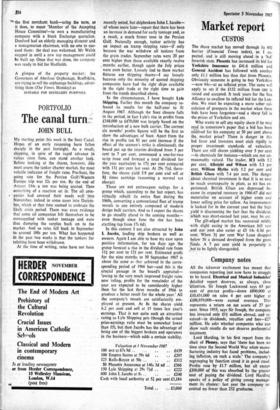Market report
CUSTOS
The share market has moved through its 400 barrier (Financial Times index), as I ex- pected, and is still moving ahead in a 'bid' feverish state. Phoenix has increased its bid for Yorkshire Insurance to £41.6 million and General Accident has followed with another only £1.1 million less than that from Phoenix. Obviously someone is going to buy Yorkshire —now 94s—of an inflated price. The same will apply to AEI if the £152 million from GEC is raised and accepted. It took years for the Sun Alliance to swallow its inflated bid for the Lon- don. We must be expecting a more sober cal- culation of prospects in the market when these bids have been forgotten—and a sharp fall in the prices of Yorkshire and AEI.
Who wants to sell any equity share if he may read in tomorrow's paper that a bid has been received for his company at 50 per cent above the market price? There is danger in this bid fever and investors must stick rigidly to proper investment standards of valuation. There are still shares yielding over 5 per cent —in chemicals for instance—which are not un- reasonably valued. The leader, ICI with 5.2 per cent, Albright and Wilson with 5.3 per cent, William Blythe with 5.2 per cent and ' British Glues with 7.4 per cent. The danger
• about chemical investment is that it is so easy to reach overcapacity in plant, as to has ex- perienced. British Glues are depressed be- cause its expected recovery in 1966-67 did not materialise on account of higher costs and lower selling price for tallow. An improvement is looked for in the current year but the high yield is discounting the fact that the dividend. which was short-earned last year, may be cut.
The gilt-edged market has recovered mildly with slight easing in the American bill rate and our own also easier at £5 14s 6.3d per cent. When 33 per cent War Loan dropped below 50 a demand developed from the gross funds. A 7 per cent yield in perpetuity is _hot to be lightly disregarded.
Company notes
All the takeover -excitement has meant that companies reporting just now have to struggle to be heard. Electrical and Musical-Industries' detailed report deserves, as always, close attention. Sir Joseph Lockwood says 65 per cent of pre-tax profits—down £800,000 at £10,431,000 on sales 4 per cent higher at £106,959,000—were earned overseas. This represents a return on net assets of 27 per cent. Since 1955, says Sir Joseph, the company has invested only Elf million abroad, and re- ceived—in dividends, royalties and fees—£27 million. He asks whether companies who can show such results do not deserve preferential treatment.
Lord Harding, in his first report from the chair of Plessey, says that 'there has been no time since the Second World War when manu- facturing industry has faced problems, includ- ing inflation, on such a scale.' The company's regrouping by function stood it in good stead. Profits rose by £1.7 million, but all except £300,000 of this was absorbed by the greater cost of paying the dividend. Lord Harding speaks of a policy of giving young manage- ment its chance: last year the company re- cruited no fewer than 252 graduates.










































 Previous page
Previous page